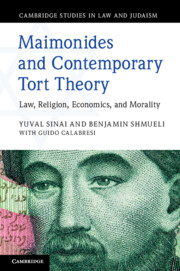Book contents
- Maimonides and Contemporary Tort Theory
- Cambridge Studies in Law and Judaism
- Maimonides and Contemporary Tort Theory
- Copyright page
- Contents
- Figures
- Introduction
- 1 Initial Presentation
- 2 Tort Liability in Maimonides’ Code:
- 3 The Foundations of the Maimonidean Theory:
- 4 The Deontological and Religious Elements of Maimonides’ Tort Theory
- 5 Consequentialist Considerations in the Guide for the Perplexed
- 6 Revisiting the Problematic Texts of the Code in Light of the Guide and Contemporary Scholarship
- 7 Maimonides’ Standard of Care:
- 8 Maimonides as a Pluralistic-Differential Scholar and Contemporary Tort Law Theories:
- 9 Reflections on Maimonides’ Tort Theory
- Index
5 - Consequentialist Considerations in the Guide for the Perplexed
Published online by Cambridge University Press: 10 August 2020
- Maimonides and Contemporary Tort Theory
- Cambridge Studies in Law and Judaism
- Maimonides and Contemporary Tort Theory
- Copyright page
- Contents
- Figures
- Introduction
- 1 Initial Presentation
- 2 Tort Liability in Maimonides’ Code:
- 3 The Foundations of the Maimonidean Theory:
- 4 The Deontological and Religious Elements of Maimonides’ Tort Theory
- 5 Consequentialist Considerations in the Guide for the Perplexed
- 6 Revisiting the Problematic Texts of the Code in Light of the Guide and Contemporary Scholarship
- 7 Maimonides’ Standard of Care:
- 8 Maimonides as a Pluralistic-Differential Scholar and Contemporary Tort Law Theories:
- 9 Reflections on Maimonides’ Tort Theory
- Index
Summary
Chapter 5 will examine consequentialist elements in Maimonides’ tort theory, based primarily on what he wrote in the Guide. We will see that although Maimonides’ theory is not consequentialist in the full sense of this term, several significant elements of consequentialism are found in his theory, notwithstanding the concurrent presence of other important elements. We also saw that Maimonides’ general approach to the objectives of tort law, mainly as emerges from the Guide, reveals an extremely important consequentialist objective – prevention of acts causing damage and deterrence. After a discussion of this important aspect of Maimonides’ tort theory, we will proceed to a comparative examination of the similarities and the differences between this theory and the modern theories of law and economics regarding torts, including the theories of some of the fathers of the economic analysis of law in general and of tort law in particular – Calabresi and Posner. We also present a certain proximity between the consequentialist approach of Maimonides and the modern approaches to punitive damages. We saw a certain similarity between his approach and the economic multiplier approach, but in our view, there is also similarity to the moral idea of societal redress in extracompensatory damages.
Keywords
- Type
- Chapter
- Information
- Maimonides and Contemporary Tort TheoryLaw, Religion, Economics, and Morality, pp. 222 - 283Publisher: Cambridge University PressPrint publication year: 2020

